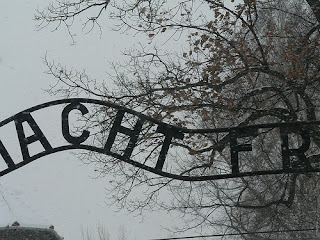I can understand why the consular officer in Sudan could have made a mistake even when the Blind Sheikh's name was on the terrorist watch list. The second piece of information used to determine if the name check result applies to the applicant is birthdate and in the Arab world, the calendar used is lunar, based on the moon, which means each year is 11 days shorter than solar calendars. It is tricky to equate a lunar year date in one year with the solar year date. And with incomplete birth records on top of that, it turns out that many people's birth dates are listed as January 1 because there is no way to be more precise than the year of birth.
 |
| Image of sign at Auschwitz by agati, via Flickr.com |
While having served in the German military was not sufficient grounds for an applicant to be ineligible, all names of German soldiers during World War II were in the name check database. Until a few years prior to my arrival in Germany, nearly every former German soldier during World War II was found ineligible under a provision that allowed a waiver to be issued. So occasionally we would receive applications from German men of the right age who knew their applications would require some time to process. One was Manfred,* whose daughter was an American citizen. He had traveled to see her every few years since she emigrated to the United States and each time he had to obtain a waiver. So he wasn't surprised this time when we invited him in for an interview. But what he didn't know was that the law had changed so that the result of the interview would either be that he no longer ever had to obtain a waiver again because his service in the German military would not rise to the level of the permanent ineligibility or that he would be permanently ineligible. Even active members of the Communist party weren't permanently ineligible, so this was a big deal. We interviewed him and sent in the report and then we waited. And we waited. And waited. By the time we got the response from the Washington, Manfred had died.
Manfred's case was very frustrating for me because we had othere applicants who were neither as understanding nor as pleasant as Manfred. Klaus,* for example, when interviewed by Elizabeth, the senior local employee, leaned across the desk and nearly yelled at her, asking, "Don't you know who I am? How important I am? One phone call is all I would need to make you disappear." And yet he was deemed to not be ineligible.
We never did understand just who he was.
Another case, Dieter,* applied for his visa with a Danish passport. He knew about the ineligibility and he thought he would be able to disguise his past with the German military by taking Danish citizenship through his wife and applying with a fresh passport. But name checks aren't keyed off citizenship; names, date and place of birth were all we needed. Dieter wasn't unpleasant like Klaus, but neither was he as understanding as Manfred. He was willing to wait, but not too long. I. The end, he, too, was found not to be subject to the ineligibility and was issued a visa.
*a name, not necessarily the right one.
No comments:
Post a Comment